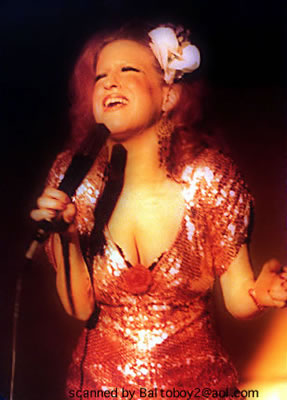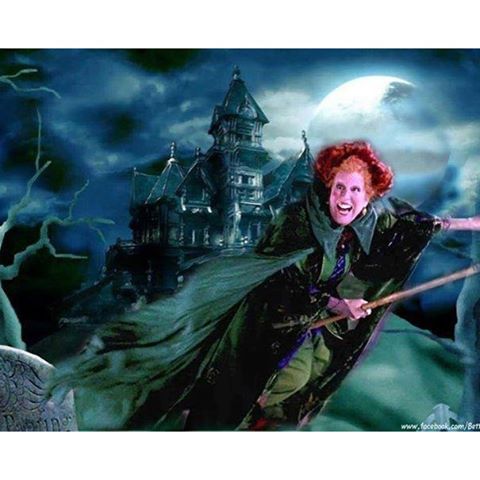Mister D: If you don’t want to donate after reading this article, something has gone terribly wrong in BetteHead land.
Bette on it: Midler will be remembered for her singular music.(Knight Ridder Newspapers)
Article from: Knight Ridder/Tribune News Service
Article date: January 30, 2004
Author: Gay, Wayne Lee
Byline: Wayne Lee Gay

Sometimes the noise covers up the music.
Such is the case with Bette Midler.
The Hawaii-born performer, now 58, was named for Bette Davis by an ambitious stage mother. And to much of the public, Midler is best known for her mixed-bag film career, her failed TV sitcom and the outrageously filthy humor of her live concerts. Self-styled as “the Divine Miss M” from her earliest days, Midler will never be Bette Davis.
But somewhere along the way, she became something else just as good.
Sometimes unnoticed under the onslaught of outrageous patter, manic multiple onstage personalities and uneven skills as a film actress, Midler has become the greatest interpreter of all time for American popular song. Yes, you read that right.
Here’s why I make this claim: First, there’s the instrument, i.e., the voice. No amount of training can make a voice happen where one hasn’t been born _ you might just as well try to grow a redwood in a patio planter. Midler has a voice as sturdy as a redwood, with true upper notes when she wants them, great low range, a Mermanesque ability to blast and a sure sense of pitch.
Lots of singers on the pop/rock/heavy metal/country/Broadway side of the musical spectrum (by which I mean the 99 percent of the music industry that’s not classical) have or had gloriously gorgeous native vocal quality.
But pop/etc. singers, most of whom support multimillion-dollar-a-year lifestyles and equally ravenous egos, tend to search desperately for what audiences want to hear _ and give it to them again and again. One of the best examples of this is Barbra Streisand, who, having discovered about five good vocal mannerisms, has repeated them ad nauseam.
Midler, however, has constantly explored variety of tone and color and style.
Early on, Midler melted the speakers on many a `70s stereo system with feminine sexiness. I can distinctly remember driving down a dirt road in backcountry Oklahoma when a voice oozed through the radio on a Top 40 station with the phrase “Do you want to dance?” Bette Midler, of course. And somehow, even this overprotected teen-age Baptist knew that she was singing about something more than dancing.
Then there’s Midler as rock star in “When a Man Loves a Woman,” paying tribute to Janis Joplin and throwing in hints of Mick Jagger, with a husky, who-cares-what-this-does-to-my-vocal-cords gravel.
Midler’s esophagus survived the rock-star imitation; 25 years later, she can still create a sound as Broadway-beautiful or as rock-star ugly as she needs.
And it’s all in the service of another nearly forgotten aspect of the pop singer’s art: the ability to interpret, to spin a mood or tell a tale in five minutes. Sometimes, she carries slender material far beyond its original intention _ as when she discovered Faulknerian pathos in “Delta Dawn,” then turned the song upside down into a gospel celebration. In spite of an inherent cynicism in her comic act, Midler even knows when to put a sentimental song out at simple, honest face value, which she does to stunning effect in the movie theme song “The Rose.”
Other crooners tend to become eternal suitors or constant victims or habitual love puppies; Midler ranges from teen-age gang moll (“Leader of the Pack”) to adorable vixen (in “Sisters,” a recent duet with Linda Ronstadt) to worn-out blues diva (with heavily loaded double entendres) in “Empty Bed Blues.”
When she chooses to do really good material _ for instance, the old Ethel Waters standard “Am I Blue?” or Kurt Weill’s “Surabaya Johnny,” a primal lament from a woman addicted to a man she hates _ Midler reveals, from a singer’s viewpoint, what 20th-century popular song can be at its best. Gay men were the first to identify with Midler’s blend of toughness and vulnerability; but she can take that vulnerability and turn it into a hymn to Everyman/woman. Will Midler ever take a good, long look at Gershwin or Porter? We hope so.
So, instead of sweeping through Bette Davis-like celluloid melodramas, as her starstruck mother must have intended, Midler points a musical spotlight for a brief moment, creating a character, painting a scene, telling a story _ then lets it all disappear with the closing chord. Bette Midler is not Bette Davis, but she can bring out the hankies as surely as Davis seduced tears or awe from bygone moviegoers. Yes, you can believe it: Fans will be listening, scholars will be studying and singers will be imitating Midler decades after most of today’s commercial music stars are forgotten.
For the Bootleg Betty Happy Birthday Bette Fundraiser For NYRP Donation Directions: Click Here

![Reblog this post [with Zemanta]](http://img.zemanta.com/reblog_e.png?x-id=79989094-d6f1-427e-b2c5-bb24774924c2)






Great article! But their little comment about Babs? Give me a break, here lol. The writer wishes to be able to sing like her. She’s recorded a helluva lot more than her 50 or so hits (try over 600 songs) and she definitely uses more than 5 vocal styles.
Anyway….I agree. I have always said since I was 13 years old that Bette was a chameleon. Able to sing any song in any style. If she is singing swing music, she sounds like The Andrews Sisters, a rock song? She sounds like Janis Joplin. An old Standard? She sounds like a female version of Bobby Darin. A pop or R&B song? She sounds like Janet Jackson. She’s something else, all right!
good point about babs….thanks to my mother, Barbra was the foundation for all of my musical taste